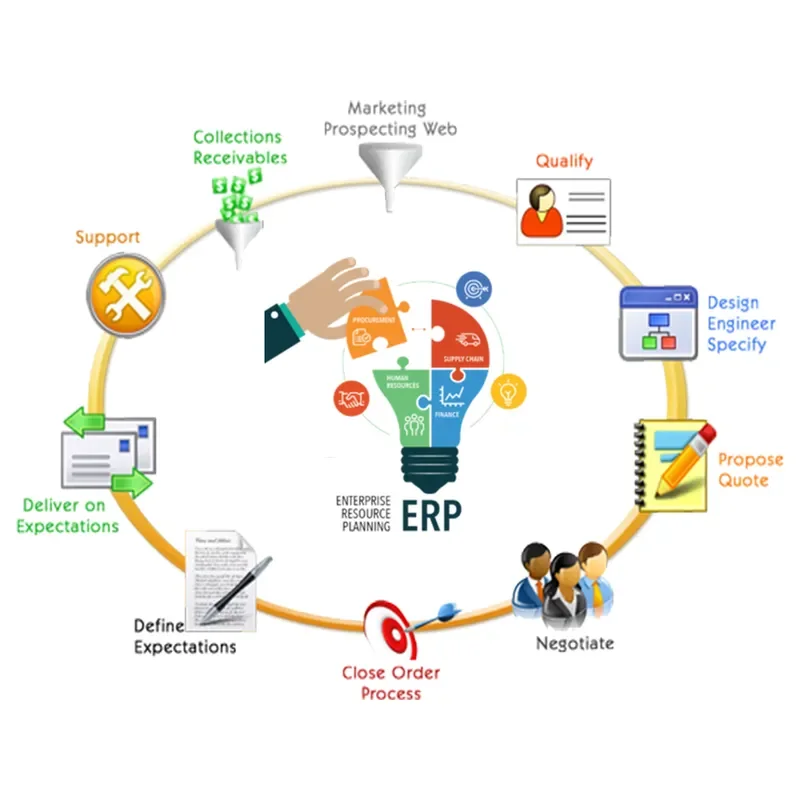Welcome to the ultimate guide on Ecommerce ERP systems! If you’re looking to streamline your online business operations and improve efficiency, you’ve come to the right place. In this comprehensive guide, we will explore everything you need to know about Ecommerce ERP systems, from what they are and how they work to the key features to look for when choosing the right system for your business. Whether you’re a small startup or a well-established online retailer, this guide will help you navigate the world of Ecommerce ERP systems with ease.
Benefits of Implementing an Ecommerce ERP System
Implementing an Ecommerce ERP System can provide numerous benefits for businesses, both big and small. One of the main advantages is the ability to streamline operations and improve efficiency. With an ERP system in place, organizations can integrate various business functions such as inventory management, order processing, and customer relationship management into a single platform. This integration allows for real-time data access and exchange between different departments, which in turn reduces the need for manual data entry and minimizes errors.
Furthermore, an Ecommerce ERP System can help businesses automate repetitive tasks, freeing up employees to focus on more strategic activities. For example, automated order processing can help companies fulfill orders faster and more accurately, leading to increased customer satisfaction.
Another benefit of implementing an Ecommerce ERP System is improved decision-making. With real-time access to key performance indicators and analytics, businesses can make informed decisions quickly. For example, managers can easily track sales trends, monitor inventory levels, and identify areas for improvement. This real-time visibility allows organizations to respond to market changes faster and stay ahead of the competition.
Moreover, an Ecommerce ERP System can help businesses create a seamless shopping experience for customers. By integrating various processes such as order processing, inventory management, and customer service, businesses can provide a more personalized and efficient buying experience. For example, customers can easily track their orders, receive updates on product availability, and contact customer service representatives through a single platform, leading to increased customer satisfaction and loyalty.
Key Features to Look for in an Ecommerce ERP System
When choosing an ecommerce ERP system, it is essential to consider the key features that will best suit the needs of your business. While every business is unique and may require different functionalities, there are some key features that are universally important when it comes to an ecommerce ERP system:
Integration with Ecommerce Platforms: One of the most important features to look for in an ecommerce ERP system is seamless integration with your ecommerce platform. This will ensure that your online store and your ERP system are synced, allowing for real-time updates on inventory, orders, and customer data. This integration will also streamline processes and eliminate the need for manual data entry, saving you time and reducing the risk of errors.
Inventory Management: Effective inventory management is crucial for any ecommerce business. A good ERP system should have robust inventory management capabilities, allowing you to track stock levels, monitor product movement, and automate replenishment processes.
Order Fulfillment: Another key feature to consider is order fulfillment functionality. An ecommerce ERP system should have tools that allow you to efficiently process orders, manage shipments, and track deliveries. Look for features such as order management, shipping integrations, and automated notifications to ensure that orders are fulfilled accurately and on time.
Customer Relationship Management (CRM): CRM capabilities are essential for building and maintaining strong relationships with your customers. A good ecommerce ERP system should have CRM features that allow you to track customer interactions, segment your customer base, and personalize marketing campaigns.
How an Ecommerce ERP System Can Streamline Operations
Implementing an Ecommerce ERP system can significantly improve the efficiency and effectiveness of an online retail business. This integrated software solution combines key business functions such as inventory management, order processing, customer relationship management, finance, and human resources into one centralized system. By streamlining these operations, an Ecommerce ERP system can help businesses save time, reduce costs, and enhance overall productivity.
Enhanced Inventory Management:
One of the key advantages of an Ecommerce ERP system is its ability to provide real-time visibility into inventory levels. This means that businesses can track stock levels accurately, reduce overstocking or stockouts, and identify slow-moving or obsolete inventory. By automating the inventory management process, businesses can streamline operations, minimize manual errors, and make better-informed decisions about purchasing and stocking products.
Improved Order Processing:
With an Ecommerce ERP system, businesses can automate and streamline the order processing cycle from the moment a customer places an order to the delivery of the product. This includes order entry, inventory allocation, shipping, and invoicing. By integrating these processes, businesses can fulfill orders more quickly, accurately, and efficiently, leading to higher customer satisfaction and repeat business.
Efficient Customer Relationship Management:
An Ecommerce ERP system can also help businesses manage customer relationships more effectively. By consolidating customer data, including purchase history, preferences, and contact information, businesses can personalize marketing campaigns, improve customer service, and build stronger relationships with customers. The system can also provide insights into customer behavior, enabling businesses to identify trends, target specific customer segments, and develop more targeted marketing strategies.
Streamlined Financial Management:
Financial management is a critical aspect of any business, and an Ecommerce ERP system can help streamline financial processes such as accounting, budgeting, and reporting. By integrating these functions into a single system, businesses can track and manage financial data more efficiently, reduce manual errors, and make better-informed financial decisions. This not only saves time but also ensures the accuracy and reliability of financial information.
Optimized Human Resource Management:
Lastly, an Ecommerce ERP system can streamline human resource management tasks such as payroll, benefits administration, and employee performance tracking. By automating these processes, businesses can save time, reduce administrative burdens, and ensure compliance with labor laws and regulations. This allows businesses to focus on strategic HR initiatives, such as talent acquisition, employee development, and workforce planning.
